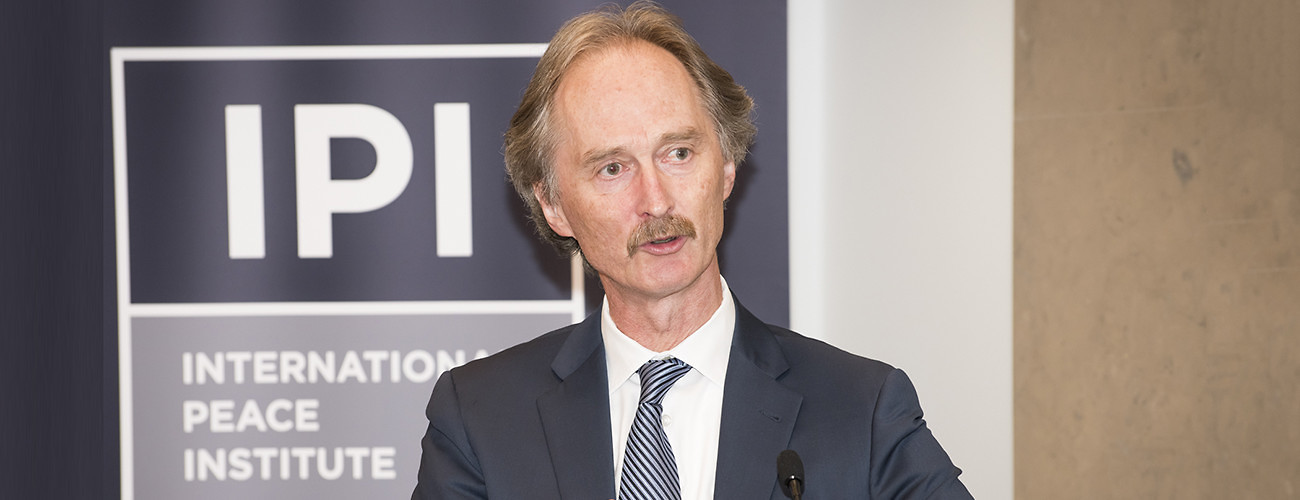Traditional approaches to peacemaking, which often have excluded female participants, are not working, as the numerous entrenched conflicts around the world demonstrate, Geir O. Pedersen, Permanent Representative of Norway to the United Nations, told an IPI audience.Opening the “Negotiating a Better Peace: New Tools for Inclusive Mediation,” Policy Forum, the Ambassador suggested an alternative. “Inclusive processes should lead to inclusive outcomes, because we want the peace to last,” he said.
Mr. Pedersen cited the growing body of research demonstrating that the inclusion of a range of actors—especially pro-peace and women’s groups—can generate political will and increase the chance of reaching a sustainable agreement.
Drawing upon Norway’s own experience in mediation, including advancing the establishment of the Sub-Commission on Gender while facilitating the peace process between Colombia and rebel group Fuerzas Armadas Revolucionarias de Colombia (FARC), he said, “Inclusion of women is not only the right thing to do, but of course, also the smart thing to do.”
The event marked the launch of the International Civil Society Action Network (ICAN)’s “Better Peace Tool,” the culmination of an extended consultative process with a full range of stakeholders active in peace mediation.
Sanam Naraghi Anderlini, ICAN’s Co-Founder, outlined four areas for mediators to consider throughout talks, offering a framework for countering extremism and gender mainstreaming.
First, mediators need to settle disagreements among themselves, she said. “When the mediators are fighting among themselves, they aren’t necessarily thinking of the people who have to live with the consequences.” She gave the cases of Syria and Mali, as two such examples where a solution was not found in part because of such internal disagreement among peacebuilders.
Ms. Anderlini said she was encouraged by the turnout at the October UN Security Council debate on women and peace and security, as the 15th anniversary of its landmark Resolution 1325, was observed. However, despite the enthusiasm the large turnout demonstrated, state performance does not always match up to their rhetoric, she lamented.
She recalled February 2014’s Geneva II Conference on Syria, the second round of UN-backed negotiations with the aim of ending the Syrian Civil War. This international peace conference lacked inclusivity, and failed to achieve much in terms of resolving the conflict. “If you think of what happened at Geneva II for Syria, many governments, including Britain, were saying, ‘Women should be at the table,’” she said. “Great, brilliant statements, except not one government invited a Syrian woman, when they were hanging around Geneva without anything to do and without passes to get into any buildings.”
Finally, she said, technical support such as specialized legal expertise on constitutions must be available to women, and that logistic and financial support, such as “getting them into buildings, getting them visas and funding to come,” must be provided to enable their effective participation.
Arthur Boutellis brought a perspective from the field, having just returned from assignment in Mali, where he participated in the UN Multidimensional Integrated Stabilization Mission in Mali (MINUSMA) as part of the team that reached an agreement in June.
Mr. Boutellis, Director of IPI’s Center for Peace Operations, echoed his fellow panelists about how a lack of smooth logistical planning can prevent the successful participation of women negotiators, even where the negotiator’s intention is for their voices to be heard.
During the negotiations between the alliance of Tuareg-led rebels and the Malian government, he said, a last ditch effort was made towards inclusivity in its final stages of the Algerian-led talks. “I had fond memories of being told four days before to fly 3 times 18 civil society representatives, getting passports in a day,” he said. “However, the problem was, as it caught everybody by surprise, we didn’t have to prepare this,” and the participation of these representatives was less influential than it could have been.
Visaka Dharmadasa, Founder and Chair of the Association of War Affected Women, said her experience with the Sri Lankan peace process confirmed recent research that inclusivity is easiest to achieve at the start of talks, though it can be brought in at any stage of the process. Including women at the peace table by design is essential, she said, emphasizing that, “what we need is talks before talks.”
While the term “diplomacy” traditionally refers to conversation between the leaders of states, Associate Director of the Conflict Resolution Program at The Carter Center, Tom Crick, said that in today’s complex peace processes, “the leaders are not always in control.”
While high-profile Track 1 diplomacy between political and military chiefs was a hallmark of the Carter Administration’s foreign policy, Mr. Crick said the former US President’s thinking has evolved with the nature of conflict. Today, the Carter Center emphasizes the necessity of “Track 2” negotiations, or unofficial dialogue and problem-solving with civil society, to reach sustainable peace agreements.
Mr. Crick also brought up the point that solutions decided too rapidly had no staying power. “We can’t stay in the same high-level patterns of being reactive and then people working on quick, high-level analyses of conflict and then responding,” he said. “We should be continually analyzing conflict on an ongoing basis both for prevention and intervention and then in peacebuilding, on one sort of continuum, so we know who these parties are, so we’re bringing them to the table, as well as the high-level actors.”
In a final illustration of the consequences of a non-inclusive peace process, Mr. Boutellis reflected on his experience in Mali, where he said, as a member of a 100-person mediation team; he worked with no more than five women peacebuilders. He suggested that as a result, humanitarian, development, reconciliation and justice concerns probably took a backseat to the security/political pillar of the resulting deal.
This event was held as part of IPI’s women, peace, and security event series and was co-hosted by the International Civil Society Action Network (ICAN).
Andrea Ó Súilleabháin, IPI Senior Policy Analyst, moderated the conversation.
Watch event:








